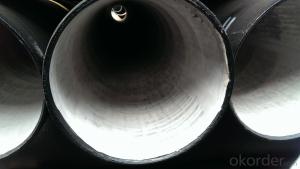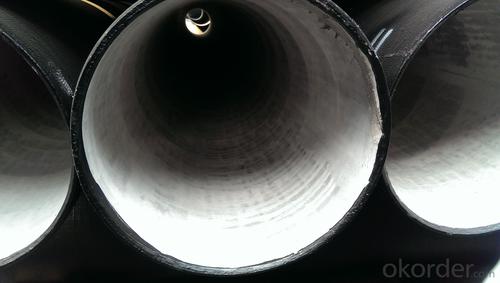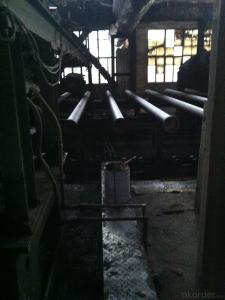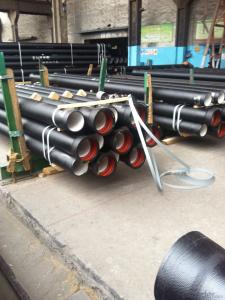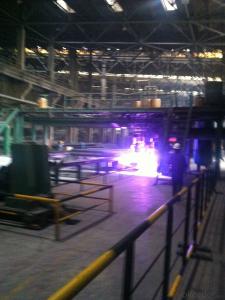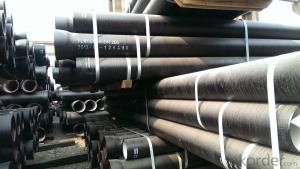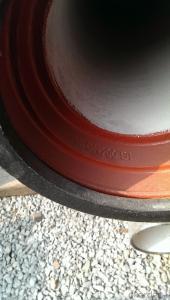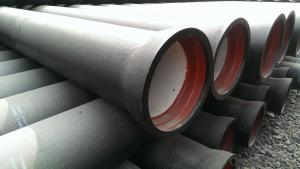DUCTILE IRON PIPES AND PIPE FITTINGS K7 DN500
- Loading Port:
- Tianjin
- Payment Terms:
- TT OR LC
- Min Order Qty:
- 20 m.t
- Supply Capability:
- 30000 m.t/month
OKorder Service Pledge
OKorder Financial Service
You Might Also Like
Material : Ductile Cast Iron
Size Range : DN 80mm to DN 2000mm
Unit Effective Length : 6m or 5.7m
Manufacture Standard: ISO 2531:1998/ EN 545:2006/EN 598:2007
Annual capacity : 200,000 tons
Coating Exterior: Zinc 130g/m2 according to ISO 8179-1 and bitumen coating 70 microns.
Cement Interior: Portland Cement/ High Alumina Cement/ Sulphate Resisting Cement Lining according to ISO 4179
Special requirements on external coating and internal lining can be applied
We also provide accessories such as SBR/EPDM rubber gaskets, lubricant paste, pipe caps, PE sleeves, etc.
Additional Parts:
Each pipe is strictly inspected according to related standard to ensure permanently high performance.
Easy Installation at site and service free for life
Long Service Lifespan
Quotation will arrive you within 24hours once we get your inquiry.
We guarantee offering you a competitive price.
A copy of original inspection reports of pipes will be offered after shipment.
Photos of loading process will be sent to the customer after shipment effect.
We will follow-up the delivery progress after shipment effect and update to the customer on weekly basis.
- Q: Are ductile iron pipes suitable for landfill leachate collection?
- Yes, ductile iron pipes are suitable for landfill leachate collection. Ductile iron pipes have excellent strength and durability, making them capable of withstanding the harsh and corrosive nature of landfill leachate. Additionally, they have a long lifespan and are resistant to both external and internal corrosion, making them a reliable choice for this application.
- Q: How does ductile iron pipe perform in areas with high soil settlement?
- Ductile iron pipe is known for its exceptional performance in areas with high soil settlement. Due to its inherent strength and durability, it can withstand the pressures exerted by settling soil without compromising its structural integrity. The flexibility of ductile iron pipe allows it to accommodate ground movements caused by soil settlement, thus minimizing the risk of pipe failure or damage. Its ability to adapt to these movements helps prevent cracks, leaks, and breaks that could occur in more rigid pipe materials. Moreover, ductile iron pipe's strong resistance to corrosion provides an added advantage in high soil settlement areas. It can withstand the corrosive effects of the soil and other environmental factors, ensuring the longevity and reliability of the pipe system. In areas with high soil settlement, ductile iron pipe is often the preferred choice due to its ability to handle ground movements without sacrificing performance. Its strength, flexibility, and resistance to corrosion make it an ideal solution for maintaining a robust and efficient water distribution system even in challenging soil conditions.
- Q: Are there any special coatings or linings used for ductile iron pipes?
- Ductile iron pipes utilize specialized coatings and linings to protect against corrosion and increase their lifespan. The interior and exterior surfaces of the pipes are treated with these coatings and linings. Several popular options for ductile iron pipes include cement mortar lining, polyethylene encasement, fusion bonded epoxy (FBE) coating, and polyurethane lining. Cement mortar lining is frequently employed to create a safeguarding layer on the inside of ductile iron pipes. This mixture of cement, sand, and water is applied to the pipe's interior surface. By doing so, it effectively prevents corrosion caused by water or other fluids flowing through the pipes. Polyethylene encasement is an additional protective coating used for ductile iron pipes. This method involves enveloping the pipes with a layer of polyethylene material. This barrier protects against environmental factors and inhibits direct contact between the pipe and the surrounding soil, minimizing the risk of corrosion. Fusion bonded epoxy (FBE) coating is a thermosetting epoxy powder coating that is administered to the exterior of ductile iron pipes. This coating provides exceptional corrosion resistance and mechanical protection. FBE coating is often utilized in aggressive environments where pipes are exposed to chemicals or high moisture conditions. Polyurethane lining is another type of lining employed for ductile iron pipes. It offers superior resistance to both corrosion and abrasion. This liquid polymer lining is sprayed onto the interior surface of the pipes, resulting in a smooth and durable protective layer that extends the life of the pipes. These coatings and linings are essential for maintaining the integrity and longevity of ductile iron pipes, ensuring optimal performance in a variety of applications such as water distribution, wastewater management, and industrial processes.
- Q: How does ductile iron pipe perform in areas with high soil acidity?
- Ductile iron pipe performs well in areas with high soil acidity due to its inherent corrosion resistance properties. The pipe is designed to withstand harsh environments and has a protective lining that prevents the acidic soil from causing damage. This lining acts as a barrier between the pipe and the soil, preventing the acid from corroding the iron. Additionally, ductile iron pipe has a high resistance to external loads, making it suitable for areas with unstable soil conditions. Overall, ductile iron pipe is a reliable choice for areas with high soil acidity as it can withstand the corrosive effects and provide long-lasting performance.
- Q: How are ductile iron pipes protected against external soil loads?
- Ductile iron pipes are protected against external soil loads through a combination of proper installation techniques and the use of protective coatings. The pipes are installed in a manner that allows for adequate support and backfilling, which helps distribute the external soil loads evenly. Additionally, these pipes are often coated with materials such as epoxy or polyethylene to provide a barrier between the pipe and the surrounding soil, preventing corrosion and damage from external forces. This protective coating ensures the longevity and durability of ductile iron pipes in underground applications.
- Q: Are ductile iron pipes suitable for road crossings?
- Yes, ductile iron pipes are suitable for road crossings. Ductile iron is a strong and durable material, making it well-suited for underground installations such as road crossings. The pipes have high tensile strength, which allows them to withstand heavy loads and traffic pressures without cracking or breaking. Ductile iron pipes also have excellent corrosion resistance properties, ensuring their longevity even in harsh environments. Additionally, these pipes are easy to install and maintain, making them a reliable choice for road crossings.
- Q: Do ductile iron pipes require external coatings or wraps?
- Yes, ductile iron pipes typically require external coatings or wraps for protection against corrosion. While ductile iron is known for its strength and durability, it is still susceptible to corrosion over time when exposed to certain environmental conditions. External coatings or wraps provide an additional layer of protection to the pipes, helping to prolong their lifespan and maintain their structural integrity. These coatings can vary and may include materials such as epoxy, polyethylene, or zinc, which act as a barrier between the pipe surface and corrosive elements in the surrounding environment. Additionally, wraps made of materials like polyethylene or polypropylene can also be used to provide mechanical protection against external factors such as impact or abrasion. Therefore, it is generally recommended to apply external coatings or wraps to ductile iron pipes to enhance their resistance to corrosion and ensure their long-term performance.
- Q: Can ductile iron pipes be used for underground cable conduits?
- Yes, ductile iron pipes can be used for underground cable conduits. Ductile iron pipes are known for their strength, durability, and resistance to corrosion, making them suitable for various applications including underground cable conduits. They have the ability to handle heavy loads and provide protection to the cables from external elements. Additionally, ductile iron pipes have a long lifespan, reducing the need for frequent replacements and maintenance. However, it is important to consider factors such as depth of burial, soil conditions, and specific requirements of the cable installation before choosing ductile iron pipes for underground cable conduits.
- Q: Do ductile iron pipes require pressure testing before installation?
- Before installation, it is necessary to conduct pressure testing on ductile iron pipes. This step is critical in guaranteeing the pipes' integrity and safety. Its purpose is to detect any leaks, weaknesses, or defects before the pipes are put into service. Pressure testing involves subjecting the pipes to higher-than-normal operating pressures to determine if they can endure the expected pressure without any failures. By doing so, this process prevents potential issues such as leaks, bursts, or failures that could result in water loss, property damage, or accidents. Hence, pressure testing is an indispensable requirement for ductile iron pipes to ensure their reliability and long-term performance.
- Q: Are ductile iron pipes suitable for use in seismic areas?
- Ductile iron pipes are indeed appropriate for usage in seismic regions. The strength and durability of ductile iron enable it to endure seismic forces and ground motions linked to earthquakes. Its exceptional flexibility and high tensile strength provide resistance against cracking or fracturing in highly challenging circumstances. Furthermore, ductile iron pipes have exhibited their trustworthiness and appropriateness in seismic zones over an extensive period. Nevertheless, to optimize their efficiency and mitigate any probable risks, it is crucial to adhere to appropriate installation methods and seismic design principles.
Send your message to us
DUCTILE IRON PIPES AND PIPE FITTINGS K7 DN500
- Loading Port:
- Tianjin
- Payment Terms:
- TT OR LC
- Min Order Qty:
- 20 m.t
- Supply Capability:
- 30000 m.t/month
OKorder Service Pledge
OKorder Financial Service
Similar products
Hot products
Hot Searches
Related keywords
